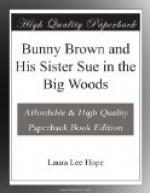Bunny managed to eat five of the cakes his mother baked, and he might have eaten another only his father called to him to hurry if he wanted to go to search for the missing toy bear.
Sue and Bunny went with Mr. Brown off into the big woods after breakfast. As they walked along they looked on either side of the path for a sight of the missing Teddy bear or Bunny’s toy train. But they saw neither one.
“Whoever took them is keeping them well hidden,” said Mr. Brown. “Now, we’ll go to the Indian camp.”
Though they called it a camp, it was more of an Indian village where the Onondagas lived. There were many tents, log or slab cabins, and one or two houses built as the white people built theirs. These were owned by the richer Indians, who had large farms and many horses and cows. Some of the Indians were very poor, and their cabins had only one room, where they cooked, ate and slept.
Eagle Feather was the head, or chief, of this particular tribe. He was not like the old-time or wild Indians. He owned a farm and he worked hard to grow fruits and vegetables.
When Eagle Feather saw Mr. Brown, with the two children, coming to the Indian village, the chief came out to meet them.
“How do!” he exclaimed in English that could be understood. “Eagle Feather glad to see you. Come in an’ sit down. Squaw make tea for you, or maybe coffee. Coffee better; more has taste.”
“No, thank you, we haven’t time to eat now,” said Mr. Brown. “We came looking for bear.”
“For bear?” cried Eagle Feather in surprise. “No bear here. Bear maybe ’way off in woods. Why you no go there and shoot ’um?”
“Oh, this isn’t that kind of bear,” said Mr. Brown.
“Funny bear, no live in woods,” said the Indian.
“This bear have eyes go like so,” and Mr. Brown took from his pocket a small electric flash light. By pressing on a spring he made the light flash up and go out, just as had the eyes of Sue’s bear.
“Oh, now Eagle Feather know,” said the Indian quickly. “Lil’ gal’s heab big medicine doll gone. Where him go?”
“That’s just what we don’t know,” said Mr. Brown. “In the night, when we were all asleep, some one came and took the bear. Maybe he came to Indian camp. Not sure, but maybe we can look.” Mr. Brown tried to talk as he thought Eagle Feather would understand. And the Indian seemed to.
“Your lil’ gal’s bear no here at Eagle Feather’s camp,” he said with a shake of his head. “Much big medicine, like baby puff-puff train doll is, but Indian no take lil’ gal’s play bear. See, I and you look in every house.”
“Oh, no, that isn’t necessary,” said Mr. Brown. “If you tell me the bear isn’t here I believe you.”
“That right, for I speak truth. But wait—we ask other Indians. Maybe they think no harm to take bear lil’ while for big medicine, and bring him back. I ask.”
Eagle Feather stepped to the door of his house and gave a loud whistle. In a few minutes there came to him many of the older Indian men. Eagle Feather spoke to them in their own Indian language. He listened to the answers.




